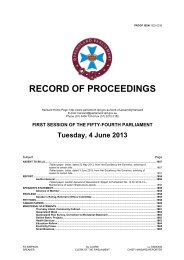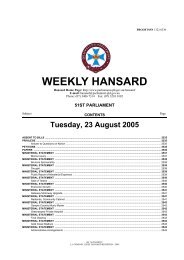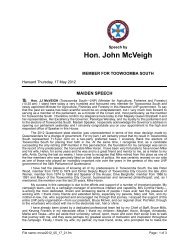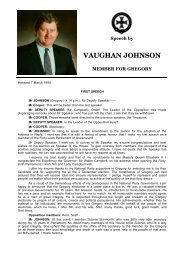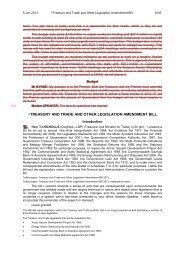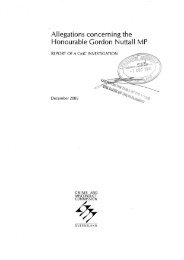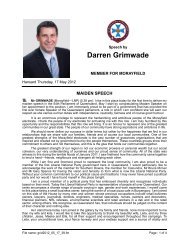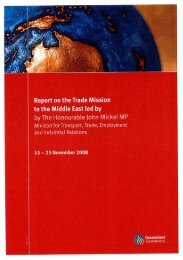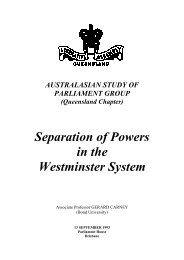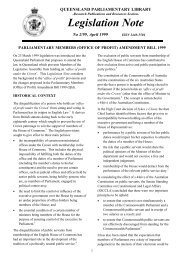Full transcript - Final - Queensland Parliament - Queensland ...
Full transcript - Final - Queensland Parliament - Queensland ...
Full transcript - Final - Queensland Parliament - Queensland ...
Create successful ePaper yourself
Turn your PDF publications into a flip-book with our unique Google optimized e-Paper software.
356 Land and Resources Tribunal Bill 9 Mar 1999<br />
Government. We should have got it over and<br />
done with in one go. Even after this, we will be<br />
revisiting the topic again when we deal with the<br />
heritage issues. I warn the Premier today that<br />
we will not be as helpful next time if the<br />
confidential draft plan on heritage matters is<br />
even approximately reflected in the final<br />
version, which may yet be many months away.<br />
That draft showed it is very clear that the<br />
intention of the Government is to provide an<br />
extraordinarily broad definition of cultural<br />
heritage matters that will simply deepen the<br />
bureaucratic nightmare confronting almost any<br />
land issue in the State these days, as a result<br />
of the Labor Party's determination to seek the<br />
edge of the envelope for the extension of the<br />
reach of native title at every turn.<br />
So with that timetable behind us, and with<br />
the work still to be done, it is just ridiculous for<br />
the Premier to claim that he has fixed native<br />
title, as he contends he has. Of course, he has<br />
not. He is dawdling his way through it with a<br />
quite biased approach that will ultimately bite,<br />
and bite hard. The delays that have been built<br />
into land management in this State by the<br />
rush by Labor politicians and their fellow<br />
travellers—the Greens, the Democrats and<br />
Senator Harradine among them—to maximise<br />
its impact are still with us. Certainty in the<br />
pastoral industry is therefore still a very long<br />
way off. Certainty for the mining industry is still<br />
a very long way off. We are nowhere near as<br />
far down the track as we should have been.<br />
Very pointedly, the establishment of this<br />
tribunal is a precursor to Commonwealth<br />
approval of the alternative State provisions<br />
related to sections 43 and 43A of the<br />
amended Native Title Act—the right to<br />
negotiate provisions. Until this tribunal is up<br />
and running, the alternative State provisions<br />
cannot come into play. We dealt with 43 and<br />
43A last year, when we had the extraordinary<br />
decision of the Government to maintain a fullblown<br />
right to negotiate for mining on pastoral<br />
land—a decision which is going to slow<br />
development in this State and cost us jobs.<br />
Even though we dealt with that last year, it is a<br />
dead letter until this Land and Resources<br />
Tribunal is up and running. So that is the cost<br />
of this piecemeal approach. That is the cost of<br />
a can't do Government. The Opposition<br />
supports both the establishment of an<br />
independent State-based tribunal and the<br />
amalgamation of the Wardens Court with the<br />
new body.<br />
It is no secret that there is considerable<br />
dissatisfaction in some quarters with the<br />
operation of the Wardens Court. This<br />
dissatisfaction is best exemplified by the<br />
decision of the Court of Appeal in late 1997<br />
which found that the Mining Warden had<br />
denied natural justice to a central <strong>Queensland</strong><br />
pastoralist. The court found that the warden<br />
had taken evidence from South Blackwater<br />
Coal after closing public hearings and without<br />
notifying the pastoralist, Mr Edward Wall.<br />
There is no doubt that many in the pastoral<br />
industry were heavily critical of the Wardens<br />
Court and believed that its decisions were<br />
biased towards mining companies. I do not<br />
wish to pick sides in that dispute, but whenever<br />
there is a situation in which a court has lost the<br />
confidence of many in the community,<br />
remedial action is required.<br />
In February last year, the Department of<br />
Mines and Energy, at the direction of the then<br />
Minister, the then member for Tablelands,<br />
released a discussion paper on the court. That<br />
document outlined a number of worthwhile<br />
reforms aimed at bolstering the court and<br />
tackling some of the major concerns that<br />
industry bodies had.<br />
This reform process has been overtaken<br />
by the need to establish a State-based body<br />
to deal with native title issues affecting the<br />
mining and pastoral industry, and I am sure<br />
that amalgamating the bodies is sensible and<br />
will hopefully help to build bridges to persons<br />
and groups who felt that they were not getting<br />
a fair go. One step that will help in this process<br />
is the explicit requirement that the tribunal<br />
must observe the rules of natural justice.<br />
A similar requirement is absent from the<br />
Minerals Resources Act, and although there is<br />
most probably a common law requirement that<br />
the Wardens Court observes this basic<br />
element of procedural fairness, it is better that<br />
it be made explicitly clear in the legislation<br />
establishing the new body. Landowners, in<br />
particular, should be very pleased that their<br />
concerns about not having a fair go, and being<br />
treated fairly, are, in part, being addressed.<br />
Section 26 of the Commonwealth Native<br />
Title Act provides that the right to negotiate<br />
applies to the creation of a right to mine. As<br />
the Premier pointed out when introducing this<br />
Bill, that includes not just mining leases but<br />
also tenures that allow exploration and<br />
prospecting and the extraction of petroleum or<br />
gas. However, the activation of the right to<br />
negotiate is avoided if the Commonwealth<br />
Minister approves alternative State provisions<br />
that comply with sections 43 and 43A.<br />
One of the key elements of obtaining<br />
Commonwealth approval for alternative State<br />
provisions is the establishment of an<br />
independent body which will hear objections,<br />
which body will include a member of the<br />
national Native Title Tribunal. In addition, an



